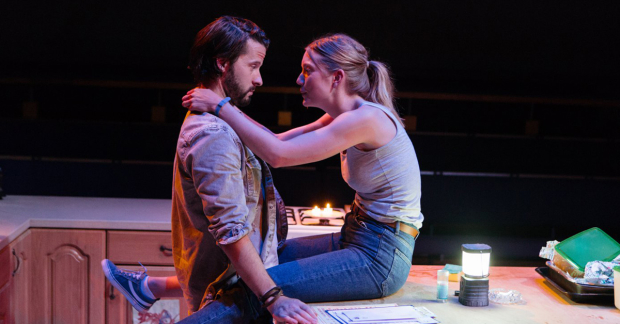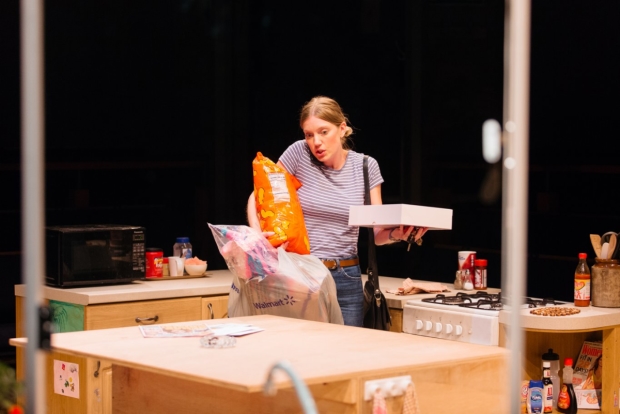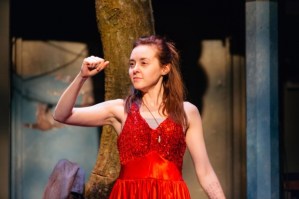Review: Utility (Orange Tree Theatre)
Caitlin McLeod directs Emily Schwend’s Yale Drama Prize-winning play

© Helen Murray
When Roseanne was cancelled the other week, after its star's indefensible racist tweet, several commentators bemoaned television's loss. They celebrated the sitcom as a sympathetic eye on white working-class life: "a frank depiction of a family living paycheck-to-paycheck in the deindustrialised midwest" that nonetheless insisted that happiness could co-exist with hardship.
Emily Schwend's Utility, winner of the Yale Drama Prize, takes the opposite tack: a drama that only ever sees the strain. Amber, "only 31, but seems older," is a mother with two jobs and three kids in east Texas. She's up at five every morning to fix lunch for the kids, and home 12 hours later to rustle up dinner. Her only me-time comes in snatched cigarettes – a moment to exhale and unpurse her lips. Her cheating husband Chris has just moved back in, promising to fix up the family home and commit, but his meagre shift work means he's mostly another mouth to feed. His help around the home extends to scoffing down toast.
Using small details of daily family life, Schwend shows the stresses of late capitalism, where standards have risen, but prices have rocketed and working all hours barely covers the costs. The electricity's cut off, and a lift to work "ain't worth the gas." Pulling a birthday party together, Amber goes all out – because she has to, because mothers want the best for their kids. A new bike gets a big unnecessary bow, and she's too time-poor to craft a piñata or cook a cake. When she drops the store-bought one, she just stares at the floor: a small slip is a calamity she can't afford. It's agonising, but it knows it – the play's too in control.

© Helen Murray
Britain's had dramas like this, understated naturalism looking at austerity life: Katherine Soper's Wish List and Alexander Zeldin's body of work. Where they operate in the workplace, Utility's domestic, but it shows the labour that goes on at home, unrewarded and unregistered. It casts an eye back cleverly. Amber's mother's on hand with a wealth of 'in my days' that seem eminently sensible (eat leftovers, buy in bulk, let kids find their own fun) yet speak of a simpler time, and the play reflects off Betty Friedan's '50s critique, The Feminine Mystique, to ask whether the price of feminist progress has really been worth it. Instead of doll-like housewives bored out of their brains, women like Amber are so busy they find themselves right on the brink. With the house empty, and a husband waiting upstairs, she sits alone in the dark, smoking silently without a thought in her head.
But if you're going to serve up a slice of apple pie life, it better taste authentic. This doesn't. It's not the cast so much as the kitchen. Robyn Addison's working mum resembles a wrung-out Taylor Swift, and Robert Lonsdale has the lethargic air of a bloke content with a beer and a ball game. But the room they rattle around in, as designed by Max Johns, is riddled with little, jarring inaccuracies. The brands might be right – Hersey's hot chocolate, Gatorade in the fridge – but the boxing's all wrong. Nothing's jumbo, nothing's bulk-bought. It's less Walmart, more Waitrose, and the fixtures and fittings belong in a British suburb, not in blue-collar Texas. Quibbles perhaps, but the play asks us to witness a way of life and, in this kitchen, something smells off.
The problem is Schwend's drama is so delicate it needs perfection or death, and Caitlin McLeod's staging is on life support. The Orange Tree, in the round, undermines its reality, and the play lacks the metaphorical resonance to survive in the abstract. Utility sits in Annie Baker's low-key slipstream, but Schwend never matches her for precision or pregnant pauses. Too many silences go slack, too many moments feel contrived and, for all it explains Trump's America, Utility ends up being a bit of a chore.






















